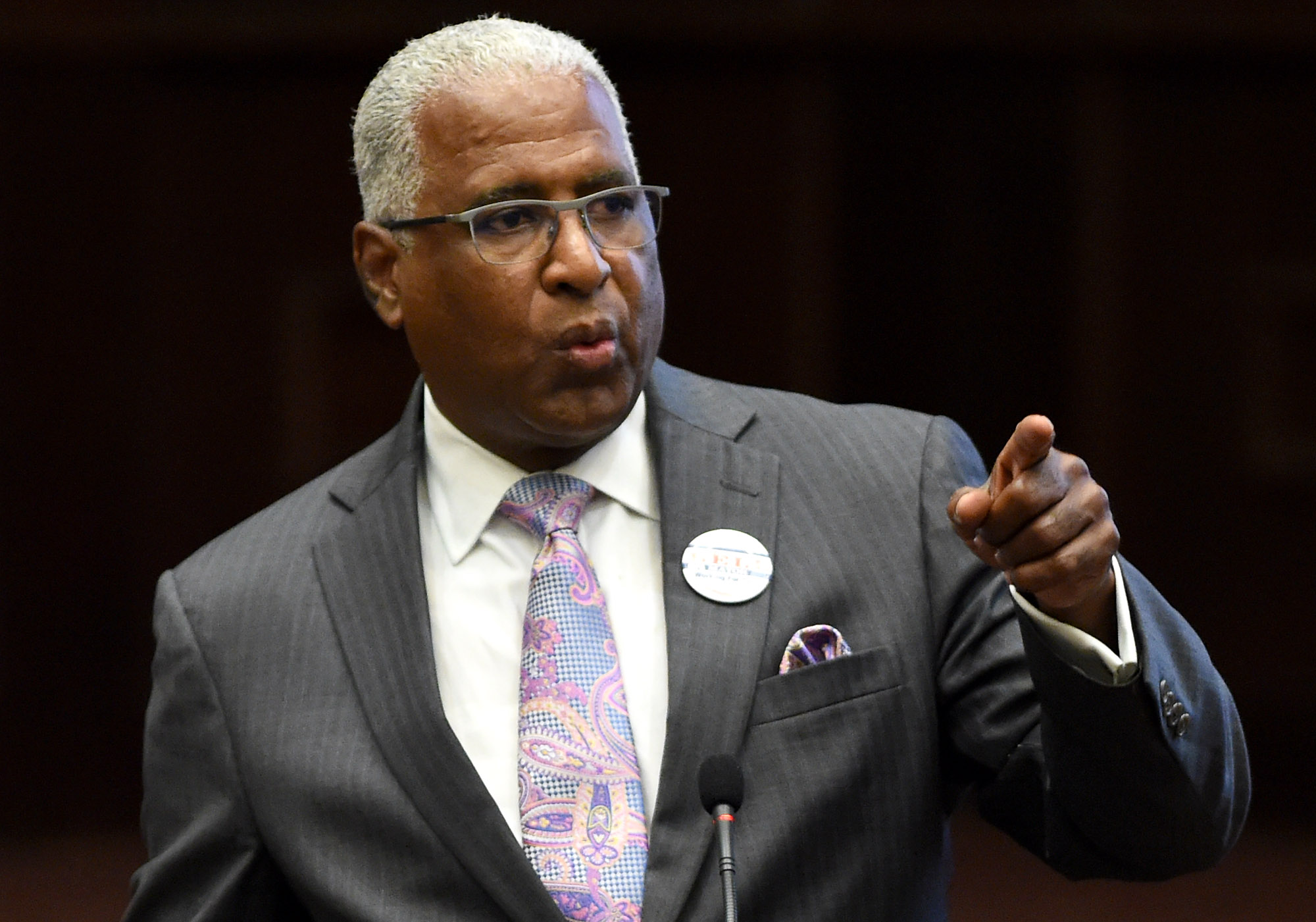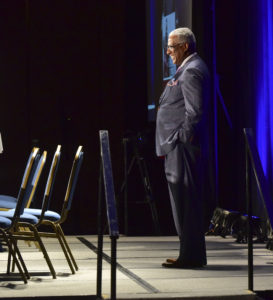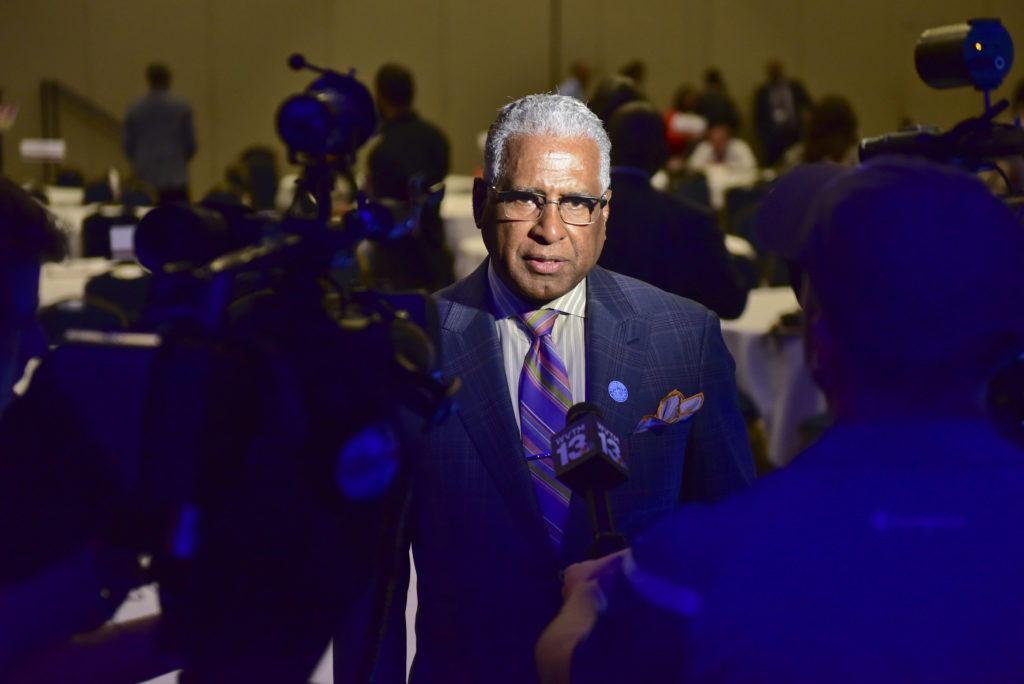
By Nick Patterson
The Birmingham Times
As any politician who has been in office for decades leaves the seat of power, the question of legacy arises. What did he or she accomplish?
That’s certainly true as Birmingham Mayor William Bell prepares to cede power on Nov. 28, to the man who unseated him, mayor-elect Randall Woodfin. Numerous experts have considered views on Bell’s legacy, which can be traced back to his 1979 election to the Birmingham City Council.
“Does Mayor Bell have a legacy? Unquestionably, the answer is yes,” said longtime Birmingham Southern College political scientist Natalie Davis. “Those who have followed Bell’s tenure as mayor will point to the development of the downtown area; the vibrant Uptown restaurant and entertainment district; and a sense that Birmingham had finally come into its own. Think World Games, CrossPlex, Special Olympics, etc.”
The World Games 2021 will take place in Birmingham. The CrossPlex athletic facilities will now include CrossPlex Village, a 38-acre development adjacent to the sports campus.
Birmingham Business Alliance (BBA) President and CEO Brian Hilson, who has long been a strong supporter of the mayor, said Bell has consistently been a good ambassador for the city and the region, whether with leaders in other states or with foreign entities engaged in business with Birmingham.

“He is especially good at introducing someone who doesn’t already know Birmingham to the community. I’ve seen that numerous times in his roles related not only to economic development and in meetings with company CEOs considering doing business here but also in a more international, diplomatic role,” Hilson said. “He’s always made himself available, and the people he’s met with have always responded very, very favorably to his interest in them. His role as a diplomat on behalf of the community … is a very good testimony to his strength as a leader in Birmingham.”
More than just serving as the face of the community, though, Bell has worked successfully in securing viable businesses in and around the city.
“As a result, more people are employed, and more families have an improved quality of life,” Hilson said. “I think we can all feel good about that.”
Larry Powell, PhD, University of Alabama at Birmingham (UAB) communication studies professor, said Bell’s legacy can be seen in new development downtown, including the Parkside District, which includes the Negro Southern League Museum — a relatively new attraction that Powell appreciates as the author of a book about baseball’s Negro Southern Leagues.
“One of the personal things I like best was the effort he made on behalf of the [museum], as well as the whole revitalization of that area with Regions Field and Railroad Park. I think [those things are] going to live on for some time,” Powell said. “He should be justifiably proud of that and his efforts to bring improvements to the downtown area. He also deserves some credit for the revitalization around the [Birmingham-Jefferson Convention Complex], the Uptown area, and so forth.”
“In the process of revitalizing the commercial districts of the city, however, revitalizing the neighborhoods took second place for him …,” Powell added. “That came back to hit him pretty hard.”
‘Too Much Blight’
Leading up to this year’s mayoral race, Bell was dogged by complaints that he wasn’t doing enough for the neighborhoods outside of downtown and tarred by a publicly rocky relationship with the city council—one example: the notorious December 2015 City Hall altercation between Bell and City Council Member Marcus Lundy. He found himself facing a field of 11 challengers, including Woodfin, who eventually defeated him in the runoff election.
Throughout the campaign and during a debate in the lead up to the Oct. 3 runoff, Woodfin made sure to point out that the mayor appeared to forget the neighborhoods.
“There are real problems in this city that the current administration has failed to address in the last seven years,” Woodfin said at the debate. “Too much blight. Too many unpaved streets. Too many overgrown lots. Too much poverty. Too much crime. And too many people don’t feel safe on their own porch.”
Efforts to reach Bell for comment for this article were unsuccessful. However, on Tuesday, during an emotional farewell in the Birmingham City Council meeting, his last as mayor, Bell choked up several times as he addressed councilors.

“When I look back on the history of my service to this city I can only say that it has been one of great pleasure, one of deepest respect and humility for all that has walked through these doors, both elected and those coming to seek help or guidance from the city government,” said Bell, during a nearly 10-minute address.
He pointed out that a lot of changes were made during his tenure and history would be the judge of how he would be remembered. “No man or woman tells their own story, their works and deeds tell their stories and someone else will look at that and make the judgement for the history books,” Bell said, “and I will await that judgment and stand ready to abide by whatever decision that history has for William Bell and his family.”
Bell, 68, began his first full four-year term as mayor in 2013. In late-2009, he won a special election to replace former Mayor Larry Langford following Langford’s federal conviction. Then in 2011, he won a shortened two-year term that was abbreviated to align with the mayor and council elections.
Under his administration, Bell has said, the city spent millions tearing down dilapidated, abandoned houses and cleaning overgrown lots. He noted that he petitioned the state legislature several years ago for permission to start the Birmingham Land Bank Authority, which “will now capture those vacant and abandoned properties and put them back into reuse. It didn’t just start this year because of an election; it’s been ongoing for some time. … For the last seven years, we progressively have torn down more houses each year than any of my predecessors as mayor,” he said, adding that this year 800 houses have been demolished, and grass and weeds have been removed from more than 15,000 vacant lots.
‘Moderate to Good’

Former Birmingham Mayor Richard Arrington, the first black politician to hold that office, knows firsthand what it means to govern in Alabama’s largest city. He also knows, from close proximity, Bell’s career, first as a city councilman, later as interim mayor, and finally as the elected mayor whose term will officially end on Nov. 28.
Asked how he would assess Bell’s tenure at City Hall, Arrington was measured.
“I think I would grade it moderate, … moderate to good,” he said. “There have been some disappointments in his earlier run for mayor and his failure to run an effective campaign against former Mayor [Bernard] Kincaid, particularly given the background he had, having been on the council for some time.”
Bell raised $1 million in the 1999 mayor’s race and was upset by Kincaid.
Arrington continued, “I think in [Bell’s] later times, he did quite well. He was not able in the last term to develop a good working relationship with the Birmingham City Council. That was a bit disappointing, but I don’t want to attribute that mainly to him. Much of it I attribute to five council members who were very much opposed to anything the mayor did. I think they made it difficult for him to accomplish some things. … They constantly hammered the mayor, and I think that worked against developing a good working relationship with the city council.”
Bell also took office following Langford, a former journalist and longtime politician who went from the Birmingham City Council to mayor of Fairfield to the Jefferson County Commission to the Birmingham mayor’s office — and was known for big initiatives. Langford’s imprisonment in 2010 left many of his ideas for Birmingham on the drawing board or otherwise incomplete.
“I attended a ceremony where he [Langford] was breaking ground for the new stadium, and the stadium never went up,” Arrington said. “He had good ideas. The CrossPlex was Langford’s idea, but it was actually built during Bell’s administration. So, I think William made some contributions. … People, particularly in the minority or black community, were very excited about Mayor Langford, [who ended up not accomplishing much of his agenda]. And Bell accomplished some of those things.”
State Rep. Merika Coleman, on sabbatical from Miles College where she has served as a political science instructor, took exception to the idea that Bell’s successes were just continuations of initiatives put in place by Langford.
“He simply could have scrapped any of the Langford ideas had he wanted to,” she noted. “You’ve got to give the Bell administration credit for the [Birmingham Civil Rights National Monument] designation, which happened during his tenure. He literally had to go to Washington, D.C., … to get that designation. That is huge for the city of Birmingham. I still think Mayor Bell has a proud legacy here. He has nothing to hang his [head] about.”
Hilson, of the BBA, agreed: “I don’t think there’s any question that Birmingham is a better city today than it was when [Bell] became mayor. … He’s worked hard. He’s made a strong commitment to the community.”




